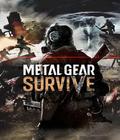The Metal Gear series has changed genres before. After all, it was the duo of Metal Gear Ac!d titles that took the series from a stealth-heavy game to a tactical card game, and Metal Gear Rising: Revengeance was all about the fast-paced action the series seemed to reserve for cut scenes. From its inception on the MSX decades ago, the game is mostly known as a stealth game first, with lots of exposition and a smattering of action when stealth skills fail you. Metal Gear Survive is Konami's attempt to blend two major game trends of the past few years with its base gameplay: survival and zombies. The result goes about as well as you'd expect.
For those expecting a straightforward story, think again. You play as an unnamed and mostly silent soldier in the mercenary army of Big Boss. During the battle between your army and the forces of XOF, Mother Base is destroyed, and you're left for dead — until you wake up very much alive and in a wasteland full of debris. According to the man on the radio, you're on Dite, a place very much like Earth but in a different dimension. An unknown organism has infected the dead and turned them into shambling corpses, and while you're infected with that same organism, you haven't turned yet. Your mission is to find any information about a new power source called Kuban and collect it. Your secondary mission is to find survivors and bring them home.
Some of the expected twists of a Metal Gear game are present. The Philadelphia Experiment in the 1940s revealed the existence of the world of Dite, while the Vietnam War showed that the infected monsters called Wanderers started to come over to this world. The person who resurrected you from the dead is working for a shadowy government organization, and while the plot meanders at times, the story remains interesting if you don't think too hard about it.
None of this is helped out by the characters. The protagonist is silent, and the other speaking characters rarely change from their initial perceptions. There's no character growth or memorable lines. To make matters worse, most of the dialogue belongs to a computer with a split personality, whose slow and bland delivery makes the lame jokes even worse. In a series where each game introduces at least one new fascinating character, this is a big step backward.
Despite the new setting and mechanics, this is still a Metal Gear game, and some of the basics from Ground Zeroes and The Phantom Pain are present. Survive takes on a behind-the-back viewpoint, complete with a threat circle that indicates the direction where you're projecting sound and the detection level of the enemy. Since the series has always been about stealth, you can do crouch walks, go prone to hide from enemies, or get the drop on the undetected. Though the game never really focused on fighting, you can execute some melee attacks and use guns and bows — if you have the ammo.
Survive tries to focus on three main areas. The first is combat, which tries to compensate for the functional system that's in place. As in many survival horror and stealth games, ammo is scarce, and although it would be easier to sneak away from the Wanderers, you'll want to kill them because they have Kuban you can harvest. You can craft bullets and melee weapons, but the latter has a durability meter, so you can't stick with the same pipe spear for very long. You can, however, employ traps and barriers to slow down or beat enemies, so simple wire fences can be used to give you time to escape or let you kill the Wanderers while they can't fight back.
The only real problem with the combat is in the lack of enemy variety. Missions that involve you going into the Dust, the large cloud that acts as an artificial barrier and is a constant presence in the world, can sometimes hide stronger Wanderers. You'll also get completely different foes to fight very late in the game. Otherwise, you fight regular Wanderers for most of the game. They're still rather dangerous, as it only takes about three hits to kill you, but once you block off their path and melee them to death, their encounters become more of a chore than a source of excitement, especially since you'll be harvesting Kuban energy from them.
Base-building is the second major component, and this part is legitimately fun. The base gives you several stations to perform tasks, such as crafting and upgrading weapons and gear, cooking food, and crafting new building pieces and structures. The placement system for each part of your base is easy to manipulate, and the necessary resources are abundant in the world. It helps that most of your structures are durable, so it'll take a long time or a massive assault before you have to worry about repairs.
The final major component that permeates the entire game is survival. As in other major survival titles, you'll gather a bunch of random scrap that you can take back to your base to craft new buildings, clothing, defensive items, and weapons. The game employs hunger and thirst meters like Metal Gear Solid 3, so you'll have to spend some time hunting down animals and drinking water. Due to their toxic nature, you'll constantly have to purify your water and cook your food unless you want to suffer from ailments. When you venture into the Dust, you'll wear on oxygen tank, which has another meter that you'll have to track. Injuries also play a big part in the game; you can easily suffer from a broken leg, which forces you to hobble back home if you aren't treated.
Survival games are meant to challenge the player, but here, the mechanics and design seem to frustrate the player for hours before the difficulty eases up. Both your hunger and thirst meters burn at a faster than normal pace, and they do so regardless of what you're doing. Walking burns it just as fast as running and fighting. Even standing at a station and crafting or going into your inventory menu doesn't stop the meter from burning down, so you'll have to eat and drink more often than in other games.
It doesn't help that food is a scarce commodity. The maps tell you where to find food, but after that, you won't see any animals or vegetables for miles. Again, that wouldn't be a problem in other survival games, but at the rate you're burning through your meters, every hunt is a special event. Water is more plentiful, but toxicity is still an issue since everything needs to be cooked and sterilized. Since you always have to do these things at a base, and you may not have enough of either meter to make the return trip, you'll often subject yourself to eating toxic food, which is terrible but keeps you alive. Things get better once you get a farm running, find warp points to quickly return to the base, and learn to purify water, but those things are several hours out from the beginning of the game. The oxygen meter burns just as quickly but takes Kuban energy to restore itself. As a result, you may delay upgrades to survive a Dust-related mission.
The campaign is long and mostly uneventful due to the narrow mission variety. There's rarely an opportunity where you aren't retrieving lost data, gathering items and supplies, or rescuing survivors. The campaign can also drag in places. This is especially true if you fail a mission because the checkpoints and autosaves are only done in base camp. Fail a mission, and you may have to spend close to an hour trying to pick up where you left off. What will frustrate players more is the fact that once you beat the game, you'll get access to some of the best weapons and traps. At that point, those rewards feel a bit insulting, as they would've been infinitely more useful if they'd been provided earlier.
The multiplayer is limited to base defense against several waves of Wanderers that grow stronger over time. The good news is that everything in this mode can carry over to the single-player game and vice versa, so there's a benefit to repeating the multiplayer missions with others. The bad news is that, as far as the PC version goes, the servers still suffer from connection issues. Players constantly drop out, and some games end prematurely, robbing people of their rewards. That's odd behavior when you consider that the connection remains stable during the single-player campaign.
The microtransactions are strange. You can buy different defender classes for your base, and you can buy boosters that increase the number of items and energy you get while the booster is active. The former seems predatory when you realize that some crafting items can only be obtained by defenders. The latter seems like a surefire way to pay for victory, but the amounts gained seem rather pitiful compared to playing without boosters. One thing that people won't appreciate is that you have to pay more money if you want to have more than one character. While that sort of thing seems acceptable in an MMO environment, having it here feels like an attempt to recoup costs, even though the game launched at a lower price point.
Like its predecessor, Survive uses the Fox Engine. When you consider when the story is set, it makes sense that almost everything here is taken wholesale from the previous game — except the Wanderers. The graphics still hold up, the environments look quite awesome, and the character models look good and animate nicely, especially the facial animations. The particle effects have been toned down a bit, but they still look good, and the game holds steady at 60fps. However, the engine doesn't seem to have gone through any refinements, which hurts given the environment change. The ever-present wall of dust affects the draw distance, and you'll see detail pop in at a closer level than before. Additionally, the frame rate runs a bit lower than in the previous game but not to the point where the difference is significant.
While the series has always been strong in the sound department, that doesn't come through in Survive. As alluded to before, the vocal performances are fine, but their delivery can be lackadaisical due to the script. Exept for Goodluck, who sounds like he's trying to channel Laurence Fishburne, no one else stands out in a positive way. The music also suffers, as nothing reaches the heights of the previous titles. It isn't bad, but you'll instantly forget the score when you exit the game.
Metal Gear Survive reveals itself to be a decent title if you're willing to forgive the litany of things it does wrong. The concept is solid, even if the characters can't deliver the tale appropriately. The sneaking and quick item construction elements slightly make up for a weak combat system that makes killing Wanderers a chore. The base-building and crafting is fine, but the other survival elements are overdone to the point of tedium. It isn't a great survival game, and it's not something that Metal Gear fans would flock to, making it a title that can be best described as niche.
Score: 6.0/10
More articles about Metal Gear Survive











 Metal Gear Survive is a brand new co-op, stealth game that takes a divergent look at familiar Metal Gear themes and pursues a fresh spirit of exploration in unique gameplay mechanics.
Metal Gear Survive is a brand new co-op, stealth game that takes a divergent look at familiar Metal Gear themes and pursues a fresh spirit of exploration in unique gameplay mechanics.



































